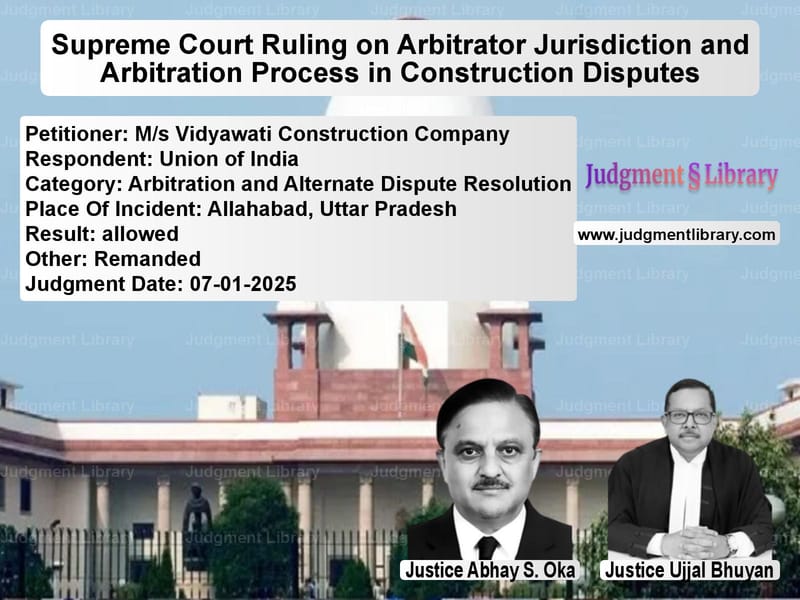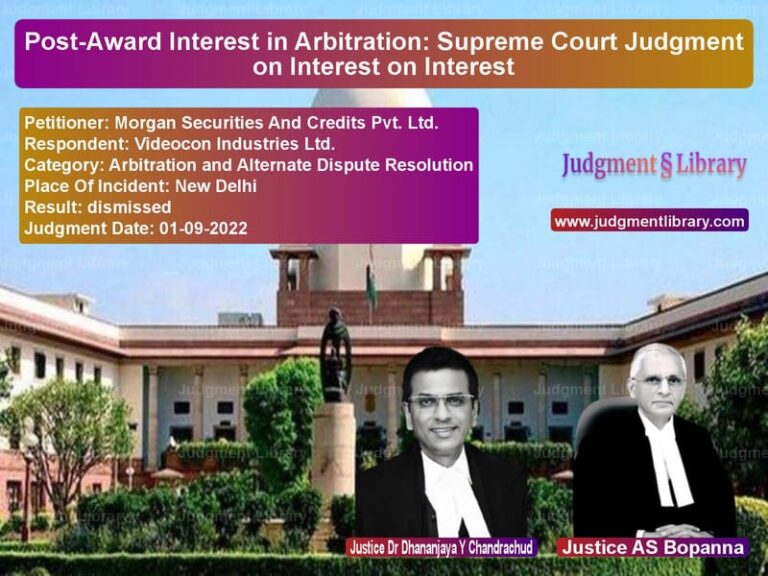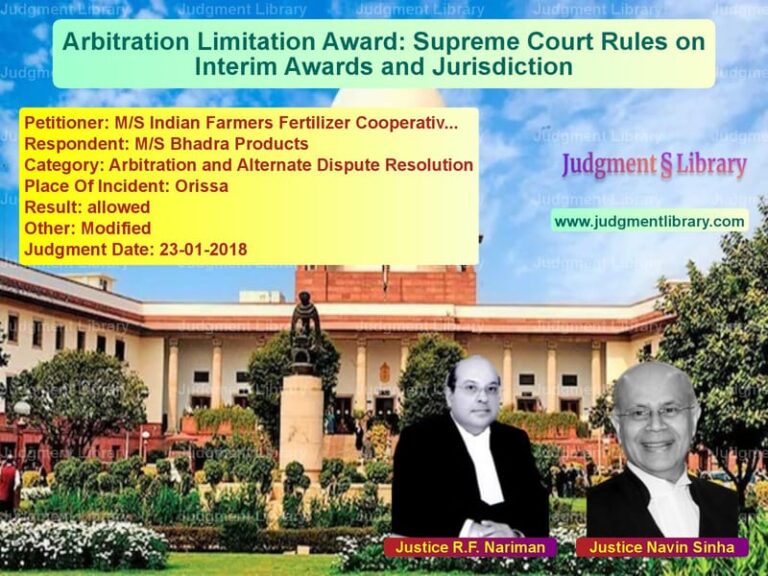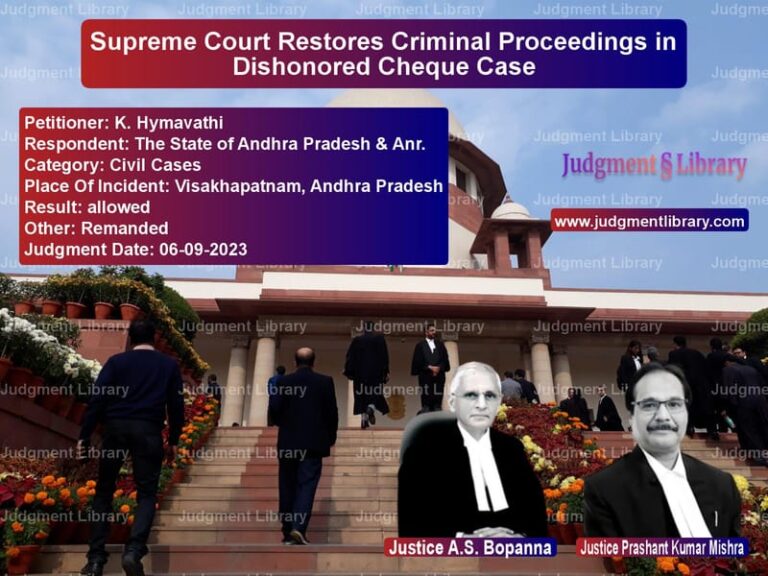Supreme Court Ruling on Arbitrator Jurisdiction and Arbitration Process in Construction Disputes
The Supreme Court recently delivered an important judgment in the case of M/s Vidyawati Construction Company v. Union of India, which addresses the complexities surrounding arbitration proceedings, particularly in relation to the jurisdiction of an arbitrator. The case concerns the interpretation of the Arbitration and Conciliation Act, 1996, and the issue of whether the respondent could object to the appointment of a sole arbitrator after agreeing to the process. The Court also examined the interplay between arbitration clauses in contracts and the procedural requirements for objecting to jurisdiction after an arbitrator’s appointment.
This case revolves around a contractual dispute between M/s Vidyawati Construction Company (the appellant) and the Union of India (the respondent). The dispute arose from a contract for the construction of a building for the General Manager, Railway Electrification Project, Allahabad. The appellant and respondent had initially agreed to resolve disputes through arbitration, but disagreements over the composition of the arbitral tribunal and the jurisdiction of the appointed sole arbitrator led to the legal challenge.
Background of the Case
The appellant, M/s Vidyawati Construction Company, was awarded a contract for construction work in 2001. However, issues arose regarding the amount to be paid for the services rendered, leading to a dispute between the parties. The contract included an arbitration clause that provided for the appointment of a three-member arbitral tribunal to resolve any conflicts. Initially, two arbitrators were appointed, and the tribunal was expected to nominate an umpire. However, the tribunal failed to appoint an umpire, prompting the respondent to approach the High Court to resolve the issue.
The High Court appointed a sole arbitrator, retired Chief Justice of the High Court, but the appellant objected to the composition of the tribunal. The appellant argued that the arbitration clause stipulated three arbitrators, not a sole arbitrator, and the jurisdiction of the arbitrator was challenged on this basis. Despite the objections, the arbitration proceeded, and an award was issued in favor of the appellant. The respondent, however, filed an appeal under Section 34 of the Arbitration and Conciliation Act, challenging the award on the grounds of improper tribunal composition.
The case then went to the Supreme Court, where the primary legal issue was whether the appellant had waived its right to challenge the composition of the tribunal by agreeing to proceed with a sole arbitrator. Additionally, the Court was tasked with determining whether the respondent had a valid objection to the jurisdiction of the sole arbitrator after having agreed to it at the outset.
Key Legal Issues
- Whether the respondent could object to the jurisdiction of the sole arbitrator after agreeing to the process and proceeding with the arbitration.
- The interpretation of the arbitration clause in the contract and its requirement for the appointment of three arbitrators versus the appointment of a sole arbitrator.
- The applicability of Section 16 of the Arbitration and Conciliation Act, which deals with the competence of the arbitral tribunal to rule on its own jurisdiction.
- Whether the respondent waived its right to challenge the sole arbitrator’s jurisdiction by filing a statement of defense without objecting to the tribunal’s composition at the earliest opportunity.
Arguments of the Parties
Petitioner’s Arguments
The appellant, M/s Vidyawati Construction Company, represented by its counsel, made the following arguments:
- The respondent, by agreeing to the appointment of the sole arbitrator, waived any objection to the tribunal’s composition. The proceedings began in December 2003, and there were multiple opportunities for the respondent to raise concerns regarding the jurisdiction of the sole arbitrator, but it did not do so until April 2004.
- Section 16(2) of the Arbitration and Conciliation Act clearly states that any objections to the jurisdiction of the arbitral tribunal must be raised at the time of submitting the statement of defense. The respondent’s failure to do so precludes them from challenging the jurisdiction at a later stage.
- The arbitration clause was clear, and even though the contract stipulated three arbitrators, both parties had agreed to the sole arbitrator’s appointment during the proceedings. The respondent’s conduct throughout the proceedings demonstrated their acceptance of this arrangement.
- In accordance with the principle of estoppel, the respondent could not now claim that the arbitrator did not have jurisdiction after having agreed to the process.
Respondent’s Arguments
The respondent, represented by the learned Additional Solicitor General, presented the following arguments:
- The appellant’s reliance on the agreement to appoint a sole arbitrator is misplaced, as the original arbitration clause in the contract specifically required the appointment of three arbitrators. The respondent had no choice but to accept the sole arbitrator’s appointment as a result of the initial failure to appoint an umpire.
- The appointment of a sole arbitrator was inconsistent with the arbitration clause, and the respondent was right to raise the objection to jurisdiction at the earliest available opportunity, which was in April 2004, as soon as the issue of jurisdiction was brought to light.
- The respondent argued that Section 16(2) of the Arbitration and Conciliation Act permits a party to raise objections to the jurisdiction of the tribunal even after filing the statement of defense if the objection is based on the tribunal’s composition or jurisdictional issues. The respondent contended that the objection was valid and should not be dismissed.
- While the appellant argued that the respondent had waived its objections, the respondent emphasized that such an objection is fundamental and goes to the root of the arbitration process. The respondent asserted that the sole arbitrator’s appointment violated the express terms of the contract and that the jurisdictional objection could not be waived.
Supreme Court’s Observations
The Supreme Court, in its judgment, made the following key observations:
“Once a party submits to the jurisdiction of the arbitral tribunal and proceeds with the arbitration process without objection, that party is precluded from raising jurisdictional objections later. In this case, the respondent’s conduct in accepting the sole arbitrator and participating in the proceedings without raising an objection until April 2004 was sufficient to waive the objection.”
The Court also referenced the provisions of Section 16(2) of the Arbitration and Conciliation Act, noting that it is a well-established principle that jurisdictional objections must be raised at the earliest stage possible. The Court stated that the failure to do so would result in a waiver of those objections, as the party would have effectively consented to the tribunal’s jurisdiction by continuing with the proceedings.
On the issue of the composition of the tribunal, the Court ruled that while the arbitration clause in the contract did indeed specify three arbitrators, both parties had agreed to the sole arbitrator’s appointment, and the conduct of the parties reflected their mutual acceptance of this arrangement. The Court observed that the parties’ consent to the change in the tribunal’s composition was clear and unequivocal.
Final Judgment and Directions
The Supreme Court ruled in favor of the appellant, M/s Vidyawati Construction Company, and held as follows:
- The judgment of the High Court, which upheld the respondent’s objections to the sole arbitrator’s jurisdiction, was set aside.
- The Supreme Court reaffirmed that the respondent’s objections to the jurisdiction of the sole arbitrator were waived by their conduct during the arbitration proceedings.
- The appeal was allowed, and the case was remanded back for further proceedings in accordance with the judgment of the Court. The arbitrator’s award was upheld, and the parties were directed to proceed with the arbitration in the light of the Court’s ruling.
Implications of the Judgment
This judgment underscores the importance of timely objections in arbitration proceedings. The ruling clarifies that a party’s failure to raise jurisdictional objections at the earliest stage effectively amounts to a waiver of those objections. This principle is crucial for ensuring that arbitration proceedings are not unduly delayed by issues of jurisdiction raised after the process has begun. The decision also reinforces the idea that consent to changes in the arbitration process, such as the appointment of a sole arbitrator, can be inferred from a party’s conduct.
Conclusion
The Supreme Court’s decision in M/s Vidyawati Construction Company v. Union of India provides critical guidance on the application of Section 16 of the Arbitration and Conciliation Act. It highlights the importance of timely raising objections regarding the composition and jurisdiction of arbitral tribunals and ensures that arbitration proceedings remain efficient and uninterrupted. This judgment will influence how similar cases are handled in the future, particularly in terms of the timelines and procedural safeguards in arbitration.
Petitioner Name: M/s Vidyawati Construction Company.Respondent Name: Union of India.Judgment By: Justice Abhay S. Oka, Justice Ujjal Bhuyan.Place Of Incident: Allahabad, Uttar Pradesh.Judgment Date: 07-01-2025.
Don’t miss out on the full details! Download the complete judgment in PDF format below and gain valuable insights instantly!
Download Judgment: ms-vidyawati-constr-vs-union-of-india-supreme-court-of-india-judgment-dated-07-01-2025.pdf
Directly Download Judgment: Directly download this Judgment
See all petitions in Arbitration Awards
See all petitions in Commercial Arbitration
See all petitions in Enforcement of Awards
See all petitions in Judgment by Abhay S. Oka
See all petitions in Judgment by Ujjal Bhuyan
See all petitions in allowed
See all petitions in Remanded
See all petitions in supreme court of India judgments January 2025
See all petitions in 2025 judgments
See all posts in Arbitration and Alternate Dispute Resolution Category
See all allowed petitions in Arbitration and Alternate Dispute Resolution Category
See all Dismissed petitions in Arbitration and Alternate Dispute Resolution Category
See all partially allowed petitions in Arbitration and Alternate Dispute Resolution Category







